
2019 Small Business Marketing Trends Report
Posted on 7th May 2019
Article By: Infusion Soft by Keap
With four years of Small Business Marketing Trends Report data collected, we’re seeing changes in the way small business owners think about marketing. Based on the information we collected, small business owners may be rethinking their approach to marketing and possibly considering a different approach in 2019.
To give us a preview of what’s to come in 2019, we spoke with marketing leaders and small business experts including:
-
Clate Mask has been educating and inspiring entrepreneurs for more than a decade. As CEO, Clate is leading Keap in its mission to simplify growth for millions of small businesses. Clate is a national speaker and contributing writer for Entrepreneur, Inc., AMEX Open Forum, and Small Business Trends focused on entrepreneurship and small business success. He is also the Co-author of the New York Times bestseller, Conquer the Chaos: How to Grow a Successful Small Business without Going Crazy.
-
Donald Miller is the CEO of StoryBrand, and every year he helps more than 3,000 business leaders clarify their brand message. He is the author of multiple New York Times best-sellers, and the #1 Wall Street Journal bestseller, Building a StoryBrand. Don is considered one of the world’s leading experts on the subject of story.
-
Pamela Slim is an author, community builder, and consultant. Pam has advised thousands of entrepreneurs as well as companies serving the small business market such as Keap, Progressive Insurance, Constant Contact and Prezi. She is best known for her book Escape from Cubicle Nation (named Best Small Business and Entrepreneur book of 2009 from 800 CEO Read) along with her follow up book Body of Work. In 2016, Pam launched the Main Street Learning Lab in Mesa, Arizona, a grassroots, community-based think tank for small business economic acceleration.
-
Meredith Wood is the editor-in-chief at Fundera, an online marketplace for small business financial solutions such as business banking accounts and business loans. Specializing in financial advice for small business owners, Meredith is a current and past contributor to Yahoo!, Amex OPEN Forum, Fox Business, SCORE, AllBusiness and more.
-
Dennis Yu is the chief technology officer at BlitzMetrics, a digital marketing company. Dennis has been featured in The Wall Street Journal, New York Times, LA Times, TechCrunch, Fox News, and is the co-author of Facebook Nation. He regularly contributes to Adweek’s SocialTimes, and has published in Social Media Examiner, Social Media Club, and Social Fresh.
-
Ultimate Sales Machine (Joey Karam) has assisted over 200,000 businesses worldwide, based on the strategies in their New York Times Best Seller by original author and founder the late Chet Holmes. Today, they assist businesses to double sales through their 12 core competencies on business growth.
These experts helped us forecast the 2019 landscape, offering valuable insights on where small businesses need to focus in 2019.
Chapter 02:Executive summary
Methodology
In October 2018, Infusionsoft by Keap surveyed a panel of 1,467 self-identified small business owners from across the United States via an online questionnaire. Respondents were not necessarily customers of Infusionsoft by Keap, and the survey did not identify Infusionsoft by Keap as a sponsor.
We asked these small business owners ten questions, including a screening question to identify small business ownership. Throughout this report, we outline their responses with charts. While not all respondents answered all questions, we received at least 1,190 responses for each question.
Executive Summary
-
More small businesses are being left behind when it comes to digital marketing. In fact, 29 percent of respondents said they won’t be using digital marketing in 2019.
-
Lack of time and resources continues to hinder small business owners with 22 percent of respondents saying this is their biggest challenge.
-
Small business owners are more in the know when it comes to their marketing efforts. Fifty-five percent know whether their efforts are effective, while 33 percent don’t know if they’re working.
-
Social media promotion continues to play a strong role for small business. Forty-eight percent of small businesses plan to use social media as one or more of their marketing tactics in 2019.
-
Facebook is still the leading social media platform for small businesses. Forty-seven percent of business owners regularly use Facebook.
-
Gaining and keeping clients remains the top marketing goal for small business in 2019.
-
While social media remains the top marketing tactic small business owners are budgeting more for in 2019 (30 percent), a significant number of business owners (46 percent) reported they won’t be spending more on marketing in 2019. This may be a result of more small business owners knowing how effective their tactics are and don’t see a need for investing additional funds towards marketing. It also could be attributed to many small businesses working with a limited marketing budget.
Chapter 03:Survey results
Goals
Driving sales is the leading goal for one-third (28 percent) of small business owners followed by a third saying none of the response options (shown below) in the survey fit their marketing goals for 2019.
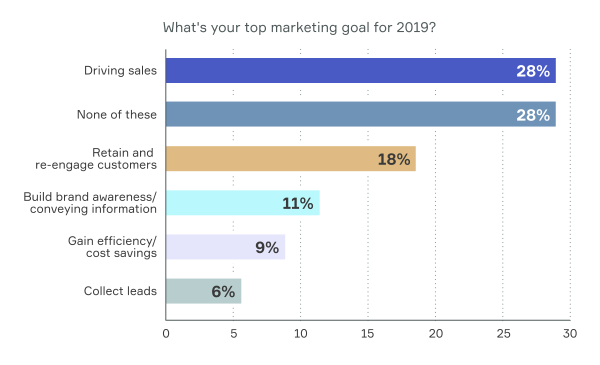
The significant number of business owners who said none of the goals are a top goal in 2019 could imply:
- They don’t have a clear marketing plan for 2019
- They may be rethinking their marketing strategy because of lackluster results and they’re considering other tactics like personalized customer service or inclusion.
Surprisingly, only nine percent indicated gaining efficiency/cost savings was their top goal for 2019, considering one of the top challenges small business owners face is finding time and resources to do marketing. We’ll take a closer look in the Challenges section of the report.
This is one of the questions we’ve asked small business owners for four consecutive years, and the goal of driving sales has remained in the top spot every year. This year came in slightly lower at 28 percent, but taking into consideration a two percent margin of error it’s comparably the same.
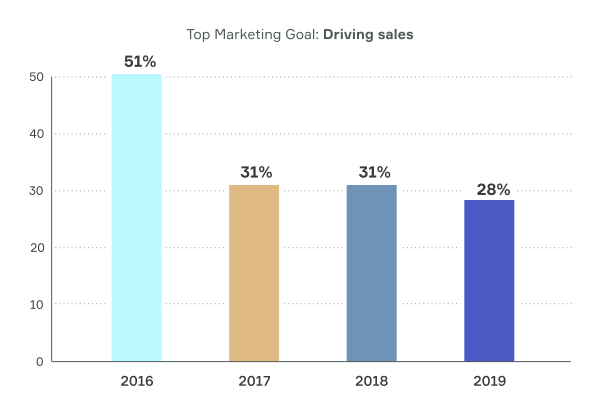
Challenges
Finding time and resources for marketing has been the biggest challenge for small business owners. Over the past four years, the number of business owners who see this as their biggest challenge steadily increased. This year, 22 percent (a gradual increase of three percent since 2016) said it’s their biggest challenge in 2019.
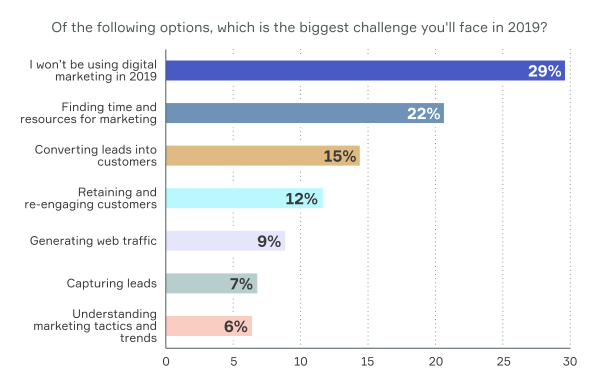
As we’ve learned from past trend reports, nearly half (49 percent) of small business owners report handling marketing for their business on their own. Pile on top all the other hats small business owners wear, it’s not surprising this is a top challenge for small business owners.
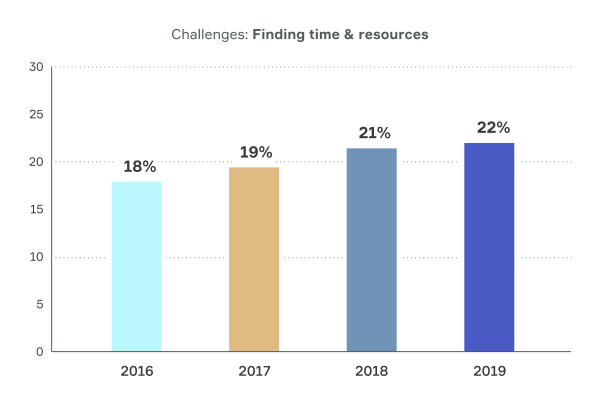
Another interesting result from this year’s survey is that 29 percent of small business owners said they won’t be using digital marketing in 2019 and consider it their biggest challenge.
As mentioned earlier, this could suggest they’re reconsidering their marketing strategy to boost its effectiveness, or they’re on a tight marketing budget and don’t realize they can still perform digital marketing on a small budget.
As technology advances, so does access to digital marketing data. It’s becoming easier and easier for business owners to gain insight into what’s working and what’s not working. Compared to past years, more business owners reported they know whether their marketing efforts are effective. Fifty-five percent said they know, while 33 percent said they didn’t know.
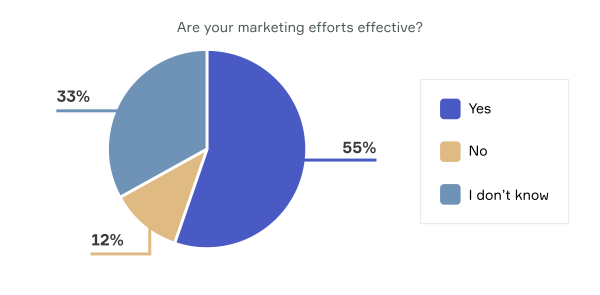
The shift this year, compared to previous years, indicates the growing use of technology among small business owners. As more business owners adopt technology and gain the benefits, like insight into their marketing efforts, their confidence starts increasing.
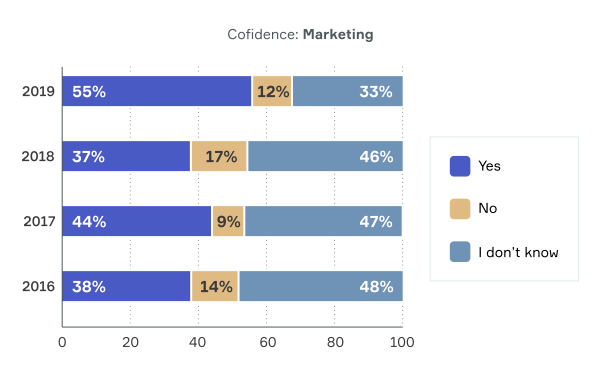
Digital marketing tactics and tools
Small business owners continue to leverage the power of social media in their marketing efforts. When asked which tools they use for marketing, almost half (49 percent) ranked social media management as their primary tool.
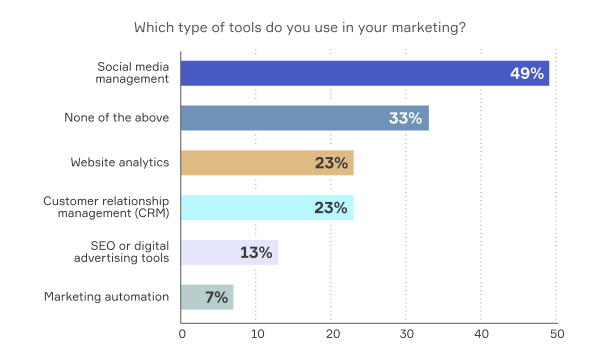
Additionally, more small business owners (up almost three percent from last year) are using a customer relationship management (CRM) tool, indicating a growing awareness and necessity to use tools like a CRM to achieve growth. Twenty-three percent said they use a CRM and website analytic tools to help them with their marketing.
When asked about marketing tactics they plan to use in 2019, almost half (48 percent) of the business owners said they plan on using social media.
Surprisingly, 34 percent said they won’t be using any of these marketing tactics in 2019. Running a successful small business is challenging, and failing to invest in marketing, or having a marketing plan in place, will make it harder to survive in a competitive market. We recommend going through an annual strategic planning exercise to prepare for the upcoming year.
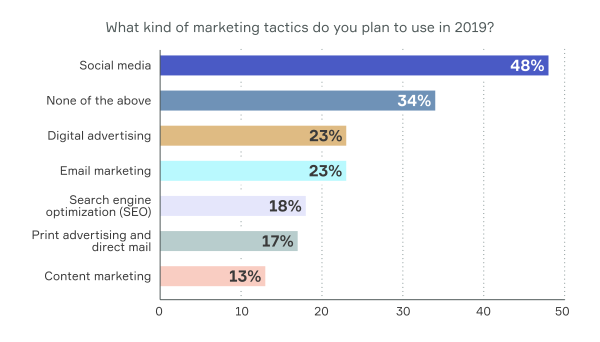
Small business owners surveyed this year said they plan to boost spending on social media with 30 percent planning to increase their budget in 2019. Other areas small business owners plan to budget for are website analytics (14 percent), CRM (13 percent), and email marketing services (13 percent).
Nearly half (46 percent) of small businesses owners said they won’t budget more for any of these marketing tactics in 2019. This can be an indication that an increasing number of small businesses are on a tight marketing budget and can’t afford to invest more in digital marketing.
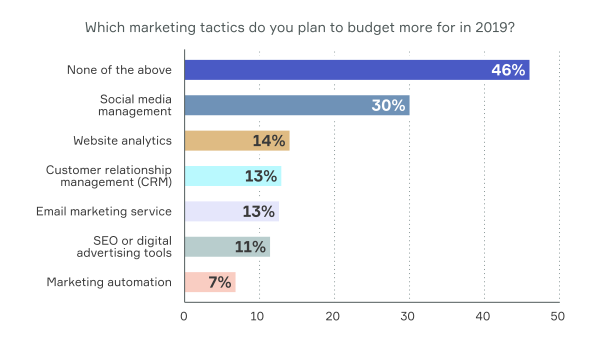
However, there are steps small business owners can take to successfully market their business on a small budget. There are free software solutions and low-cost ways of marketing that can help small businesses with limited resources.
The only downside to using multiple tools, is that it can lead to challenges with productivity and proper management of client and lead information across multiple platforms. CRMs help contain the chaos which can quickly creep into a small business juggling various tools. More and more business owners are realizing the benefits of using a CRM. As we mentioned earlier, 13 percent plan to increase their investment in 2019.
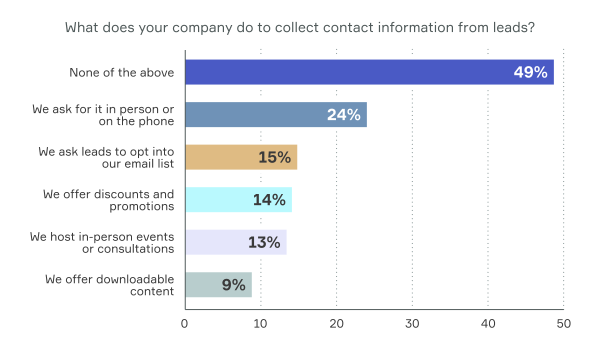
We asked small business owners what they’re doing to collect contact information from leads and almost half (49 percent) selected none of the above. While this response received a higher ranking compared to last year, it may be an indication that small business owners who responded to this survey aren’t doing anything with the contact information they’re collecting because they’re wearing multiple hats and don’t have time to keep up. Unfortunately, many small businesses encounter this problem and leave numerous missed opportunities on the table.
Asking for contact information in person or on the phone came in as the next top response with 24 percent of business owners saying this is the method they use. As in past years, small businesses rely heavily on in-person or phone interactions to collect contact information from their leads, especially service-based businesses.
A small percentage of business owners said they’re using digital marketing tactics like email opt-ins or asking leads to opt into their email list. Using digital tactics in conjunction with a CRM can provide the personalized experience clients demand while ensuring leads aren’t missed or forgotten.
Social media marketing strategies
Small businesses continue to see success from social media and it still ranks as the top method of content small businesses acquire new clients. However, a significant number of business owners (45 percent) said they don’t create any of these pieces of content.
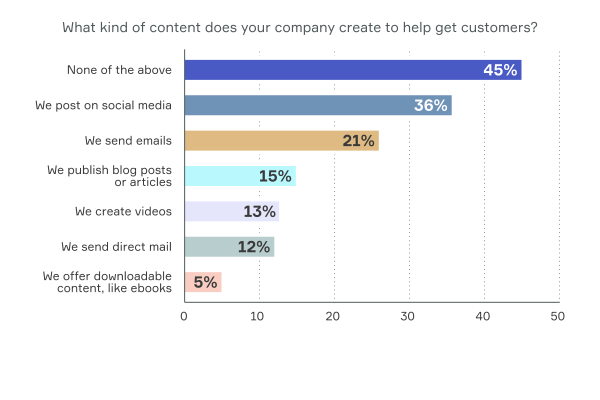
Small businesses that don’t incorporate content marketing into their marketing strategy are losing opportunities. The cost-savings alone is worth the time and effort that goes into content marketing. In fact, content marketing costs 62 percent less than traditional marketing and generates 3 times more leads. Content marketing continues to prove its value into 2019, especially for small businesses with a small marketing budget.
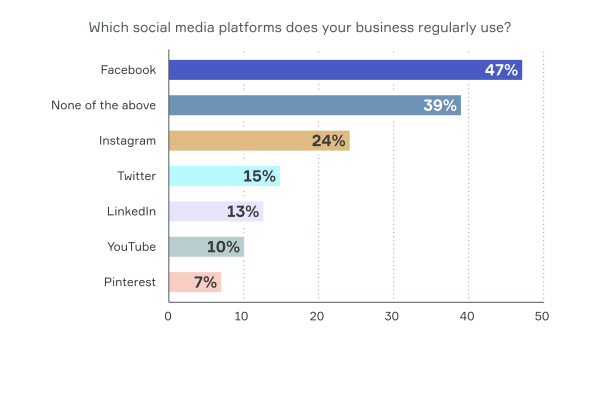
For three years in a row, Facebook remains the top social media platform small businesses regularly use. This year, 47 respondents said they use Facebook, followed by 24 percent saying they use Instagram. Notably, Pinterest usage dropped almost 50 percent from last year down to seven percent saying they use it regularly.
Facebook continues to be the number one choice for small businesses despite the increase in new social media channels because it offers the largest platform for consumers. It just makes business sense—businesses that use social media are able to reach a broader range of potential clients, connect with their audience, and share relevant content.
Click here to continue reading
